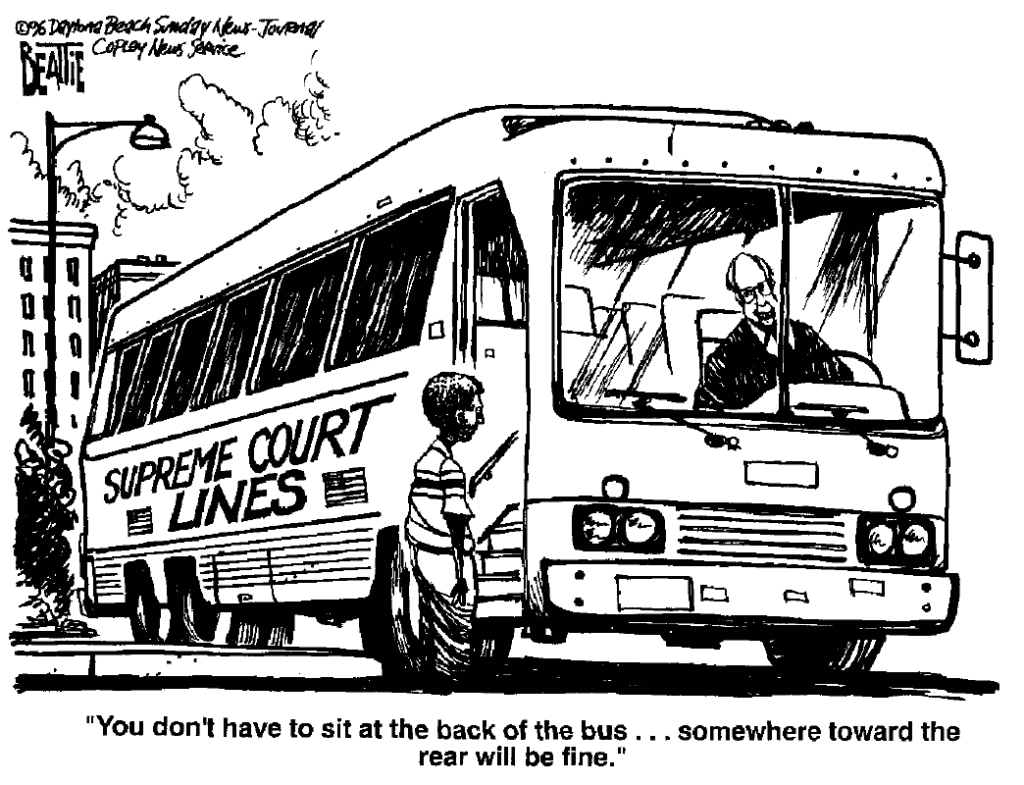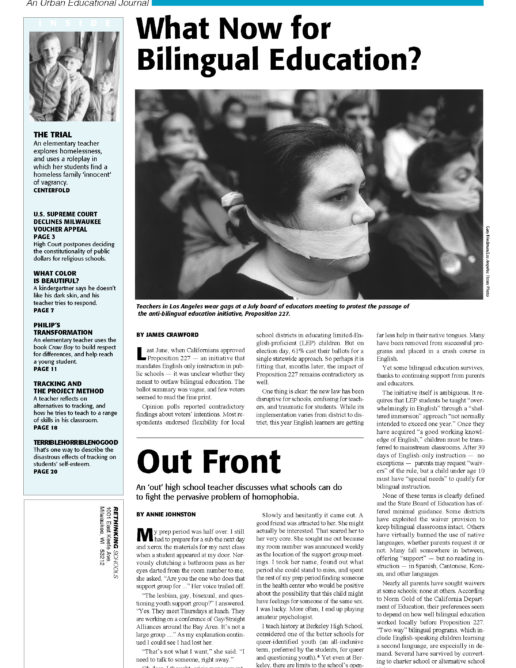Equity Takes a Hard Hit
Across the country, concern with equity is dwindling as voters, school boards, and federal courts look instead to "race neutral" policies

Recent events throughout the country demonstrate why progressive educators must fight to keep equity as the central focus in school reform.
Voters in Washington state this November passed Initiative 200, which bans race and gender preferences in public college admissions and government employment. Patterned after Proposition 209 in California, the referendum is expected to withstand legal challenge. Both the California and Washington referenda follow court decisions such as Hopwood v. State of Texas, a 1996 federal appeals court ruling that prohibited race-based admissions at the University of Texas Law School. These developments are particularly disturbing because they restrict affirmative action programs even more severely than did the 1978 U.S. Supreme Court Bakke decision.
Proof that the attack on affirmative action has “trickled down” to the pre-collegiate level came in late November, when the U.S. Court of Appeals for the 1st Circuit ruled 2-1 that there is no legal justification for the Boston’s school district’s policy of using race as criteria for admissions to the city’s prestigious Latin School and two other “exam schools.” Litigation pending in other states is likely to follow the same pattern. The full impact of such decisions and subsequent administrative rulings portend poorly for children of color. Decades of work to desegregate schools and to create equal access are threatened.
The attacks on race-sensitive policies are led by conservative groups such as the Washington, DC-based Center for Individual Rights. They unfold in the context of a frontal assault on the gains of the Civil Rights Movement.
In the years during and following the Civil Rights Movement, communities of color have fought for full access to all educational programs for their children. Struggles have included battles over desegregation of public schools, conflicts over admission policies at public and private universities, and attempts to end the discriminatory effects of tracking, ability grouping, and gate-keeping standardized tests.
Until recent years there was, by and large, a bipartisan consensus that the attempt to overcome centuries of discrimination was a worthwhile educational goal. Even Richard Nixon initially supported affirmative action. Beginning in the 1970s, however, with the growing power of the conservative movement and the eventual rise of Ronald Reagan, attention shifted toward protecting the “rights” of white students and already privileged students. Turning rhetoric on its head in a manner that would make George Orwell proud, opponents of race-sensitive affirmative policies have posited that such policies are racist because they are not “color blind.”
Institutionalized Racism
Demands for allegedly race-neutral criteria of “merit” and “standards” fail to recognize this country’s historical and ongoing record of institutionalized discrimination. (Current examples are plentiful, including unequal school funding, red-lining and housing segregation, and discrimination in job promotion.) Moreover, the standardized tests used to determine “merit” are notoriously biased in favor of those with higher socio-economic status or those whose parents have a higher level of education. Skin color and circumstance of birth, not merit and ability, are undeniable factors in such tests.
In Milwaukee, meanwhile, tracking is being exacerbated by the expanded use of admission criteria for high schools. Three additional high schools plan to screen their students for the upcoming fall, bringing to six the number of schools doing so. Some board members are even talking of admission standards for middle schools – although, to our knowledge, no one has yet proposed them for kindergarten.
Progressive educators must redouble their efforts to ensure that equity remains in the forefront of all education reform. For example, renewed efforts to justify the tracking of students on the basis of alleged ability must be countered with thoughtful, equalitarian programs that promote high expectations and standards for all children. Further, such programs must provide additional resources for students who need extra help, and for teachers who need training so that their de-tracked classrooms work well for all. Attacks on affirmative action must be shown for what they are – attempts to strengthen the privileges of the already privileged and to justify the second-class citizenship our country affords people of color.
Regardless of the specific form that the sorting, tracking and selecting takes, its use is clearly on the rise. Progressive educators must be willing to buck current trends and demand that school boards, districts, schools, state legislatures, and federal courts affirm their commitment to equity – and uphold, not dismantle, policies that increase opportunities for all.

